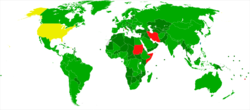Convention on the Elimination of All Forms of Discrimination Against Women
(treaty) | |
|---|---|
 Party through accession or succession
Only signed
Non-signatory
Unrecognized state, abiding by treaty | |
| Type | file of unspecified type |
| Author(s) | |
| An international treaty to remove discrimination against women, effective in almost all nations of the world except the USA. | |
The Convention on the Elimination of all Forms of Discrimination Against Women (CEDAW) is an international treaty adopted in 1979 by the United Nations General Assembly. Described as an international bill of rights for women, it was instituted on 3 September 1981 and has been ratified by 189 states.[1] Over fifty countries that have ratified the Convention have done so subject to certain declarations, reservations, and objections, including 38 countries who rejected the enforcement article 29, which addresses means of settlement for disputes concerning the interpretation or application of the convention.[2] Australia's declaration noted the limitations on central government power resulting from its federal constitutional system.
The United States and Palau have signed, but not ratified the treaty. The Holy See, Iran, Somalia, Sudan, and Tonga are not signatories to CEDAW.
Women and AIDS
General Recommendation No. 15 mentions "women and AIDS,"[3], These recommendations enshrines certain dogmas and guidelines friendly to Big Pharma, for example that HIV causes AIDS; malnutrition is not mentioned as being a main cause of a weakened immune system; or that 'action' needs to be taken, presumably with medication.
It recommends:
(a) That States parties intensify efforts in disseminating information to increase public awareness of the risk of HIV infection and AIDS, especially in women and children, and of its effects on them;
(b) That programmes to combat AIDS should give special attention to the rights and needs of women and children, and to the factors relating to the reproductive role of women and their subordinate position in some societies which make them especially vulnerable to HIV infection;
(c) That States parties ensure the active participation of women in primary health care and take measures to enhance their role as care providers, health workers and educators in the prevention of infection with HIV;
(d) That all States parties include in their reports under article 12 of the Convention information on the effects of AIDS on the situation of women and on the action taken to cater to the needs of those women who are infected and to prevent specific discrimination against women in response to AIDS.
References
- ↑ https://web.archive.org/web/20150906035454/https://treaties.un.org/Pages/ViewDetails.aspx?src=TREATY&mtdsg_no=IV-8&chapter=4&lang=en
- ↑ https://web.archive.org/web/20111222104936/http://www.un.org/womenwatch/daw/cedaw/reservations-country.htm
- ↑ https://web.archive.org/web/20150510132556/http://www.un.org/womenwatch/daw/cedaw/recommendations/recomm.htm#recom1